Electronic Transactions Act
VerifiedAdded on 2022/09/05
|10
|2476
|35
AI Summary
Contribute Materials
Your contribution can guide someone’s learning journey. Share your
documents today.
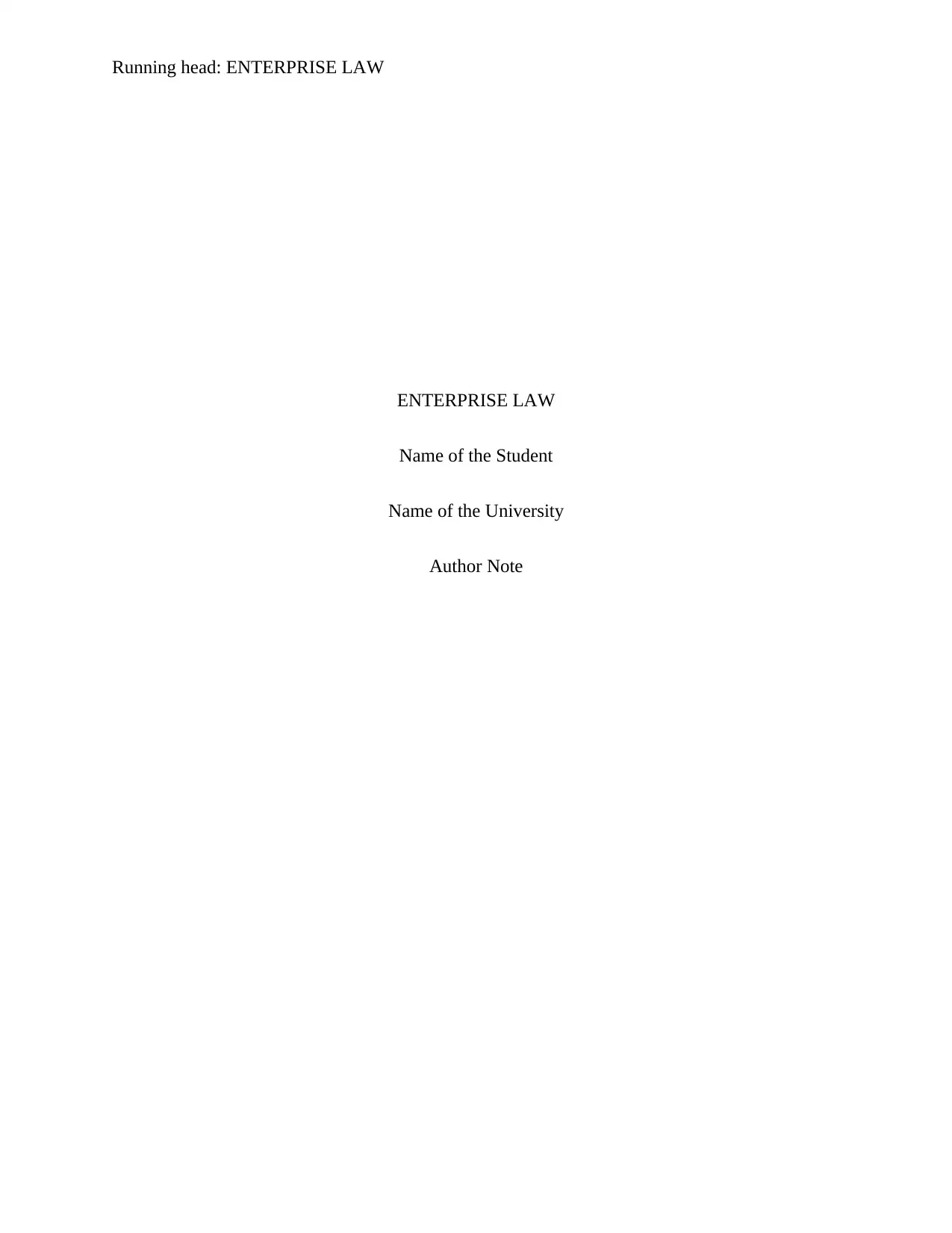
Running head: ENTERPRISE LAW
ENTERPRISE LAW
Name of the Student
Name of the University
Author Note
ENTERPRISE LAW
Name of the Student
Name of the University
Author Note
Secure Best Marks with AI Grader
Need help grading? Try our AI Grader for instant feedback on your assignments.
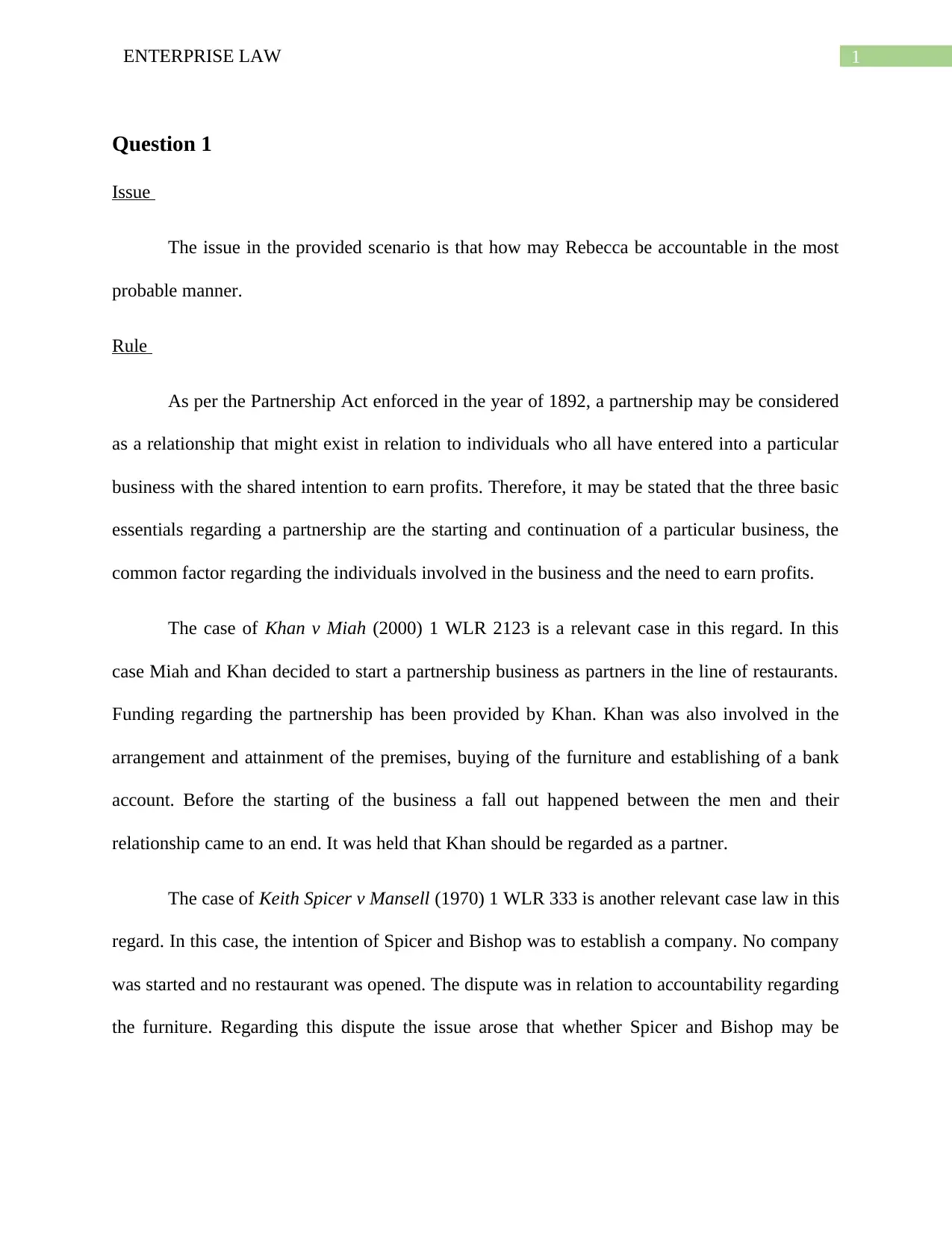
1ENTERPRISE LAW
Question 1
Issue
The issue in the provided scenario is that how may Rebecca be accountable in the most
probable manner.
Rule
As per the Partnership Act enforced in the year of 1892, a partnership may be considered
as a relationship that might exist in relation to individuals who all have entered into a particular
business with the shared intention to earn profits. Therefore, it may be stated that the three basic
essentials regarding a partnership are the starting and continuation of a particular business, the
common factor regarding the individuals involved in the business and the need to earn profits.
The case of Khan v Miah (2000) 1 WLR 2123 is a relevant case in this regard. In this
case Miah and Khan decided to start a partnership business as partners in the line of restaurants.
Funding regarding the partnership has been provided by Khan. Khan was also involved in the
arrangement and attainment of the premises, buying of the furniture and establishing of a bank
account. Before the starting of the business a fall out happened between the men and their
relationship came to an end. It was held that Khan should be regarded as a partner.
The case of Keith Spicer v Mansell (1970) 1 WLR 333 is another relevant case law in this
regard. In this case, the intention of Spicer and Bishop was to establish a company. No company
was started and no restaurant was opened. The dispute was in relation to accountability regarding
the furniture. Regarding this dispute the issue arose that whether Spicer and Bishop may be
Question 1
Issue
The issue in the provided scenario is that how may Rebecca be accountable in the most
probable manner.
Rule
As per the Partnership Act enforced in the year of 1892, a partnership may be considered
as a relationship that might exist in relation to individuals who all have entered into a particular
business with the shared intention to earn profits. Therefore, it may be stated that the three basic
essentials regarding a partnership are the starting and continuation of a particular business, the
common factor regarding the individuals involved in the business and the need to earn profits.
The case of Khan v Miah (2000) 1 WLR 2123 is a relevant case in this regard. In this
case Miah and Khan decided to start a partnership business as partners in the line of restaurants.
Funding regarding the partnership has been provided by Khan. Khan was also involved in the
arrangement and attainment of the premises, buying of the furniture and establishing of a bank
account. Before the starting of the business a fall out happened between the men and their
relationship came to an end. It was held that Khan should be regarded as a partner.
The case of Keith Spicer v Mansell (1970) 1 WLR 333 is another relevant case law in this
regard. In this case, the intention of Spicer and Bishop was to establish a company. No company
was started and no restaurant was opened. The dispute was in relation to accountability regarding
the furniture. Regarding this dispute the issue arose that whether Spicer and Bishop may be
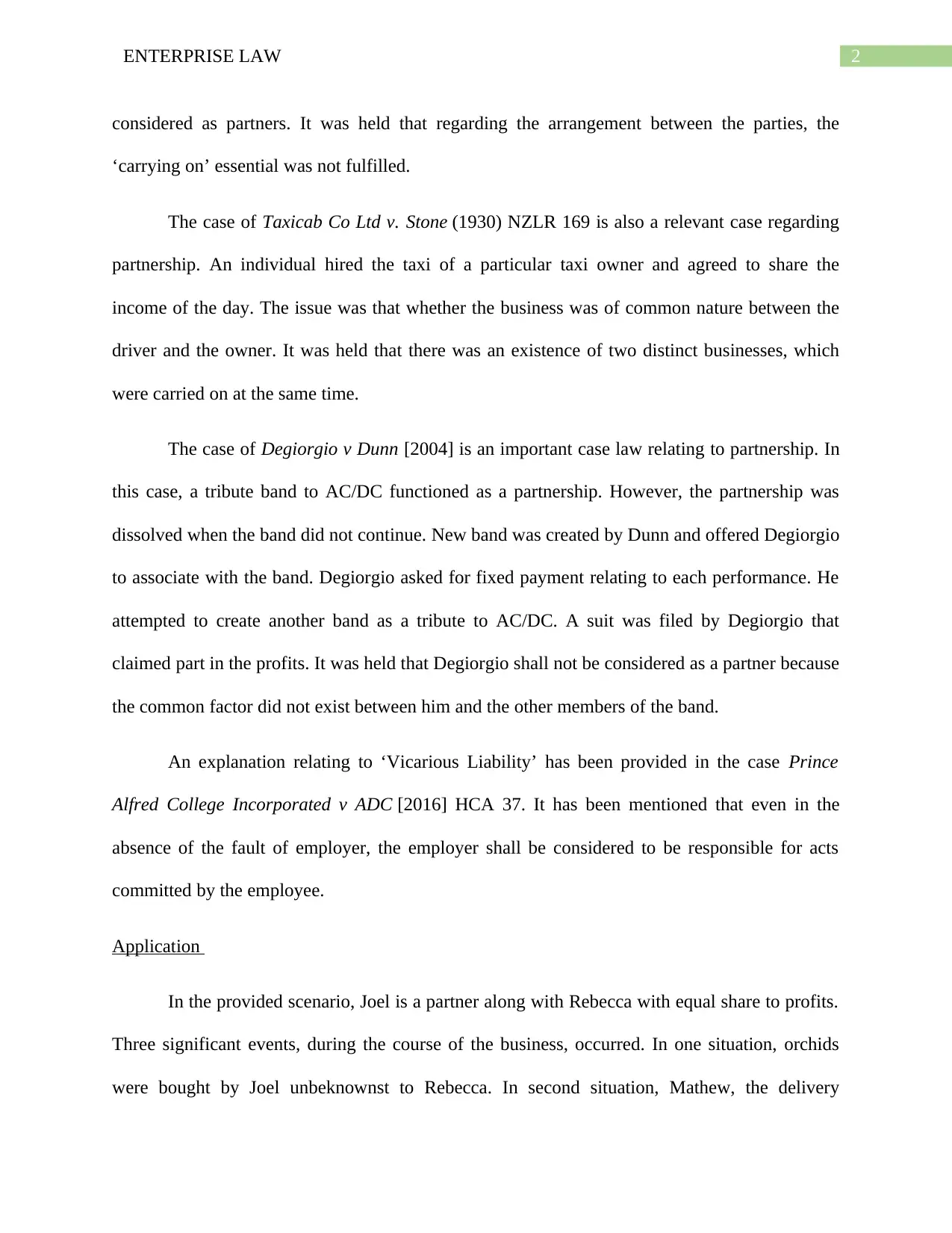
2ENTERPRISE LAW
considered as partners. It was held that regarding the arrangement between the parties, the
‘carrying on’ essential was not fulfilled.
The case of Taxicab Co Ltd v. Stone (1930) NZLR 169 is also a relevant case regarding
partnership. An individual hired the taxi of a particular taxi owner and agreed to share the
income of the day. The issue was that whether the business was of common nature between the
driver and the owner. It was held that there was an existence of two distinct businesses, which
were carried on at the same time.
The case of Degiorgio v Dunn [2004] is an important case law relating to partnership. In
this case, a tribute band to AC/DC functioned as a partnership. However, the partnership was
dissolved when the band did not continue. New band was created by Dunn and offered Degiorgio
to associate with the band. Degiorgio asked for fixed payment relating to each performance. He
attempted to create another band as a tribute to AC/DC. A suit was filed by Degiorgio that
claimed part in the profits. It was held that Degiorgio shall not be considered as a partner because
the common factor did not exist between him and the other members of the band.
An explanation relating to ‘Vicarious Liability’ has been provided in the case Prince
Alfred College Incorporated v ADC [2016] HCA 37. It has been mentioned that even in the
absence of the fault of employer, the employer shall be considered to be responsible for acts
committed by the employee.
Application
In the provided scenario, Joel is a partner along with Rebecca with equal share to profits.
Three significant events, during the course of the business, occurred. In one situation, orchids
were bought by Joel unbeknownst to Rebecca. In second situation, Mathew, the delivery
considered as partners. It was held that regarding the arrangement between the parties, the
‘carrying on’ essential was not fulfilled.
The case of Taxicab Co Ltd v. Stone (1930) NZLR 169 is also a relevant case regarding
partnership. An individual hired the taxi of a particular taxi owner and agreed to share the
income of the day. The issue was that whether the business was of common nature between the
driver and the owner. It was held that there was an existence of two distinct businesses, which
were carried on at the same time.
The case of Degiorgio v Dunn [2004] is an important case law relating to partnership. In
this case, a tribute band to AC/DC functioned as a partnership. However, the partnership was
dissolved when the band did not continue. New band was created by Dunn and offered Degiorgio
to associate with the band. Degiorgio asked for fixed payment relating to each performance. He
attempted to create another band as a tribute to AC/DC. A suit was filed by Degiorgio that
claimed part in the profits. It was held that Degiorgio shall not be considered as a partner because
the common factor did not exist between him and the other members of the band.
An explanation relating to ‘Vicarious Liability’ has been provided in the case Prince
Alfred College Incorporated v ADC [2016] HCA 37. It has been mentioned that even in the
absence of the fault of employer, the employer shall be considered to be responsible for acts
committed by the employee.
Application
In the provided scenario, Joel is a partner along with Rebecca with equal share to profits.
Three significant events, during the course of the business, occurred. In one situation, orchids
were bought by Joel unbeknownst to Rebecca. In second situation, Mathew, the delivery
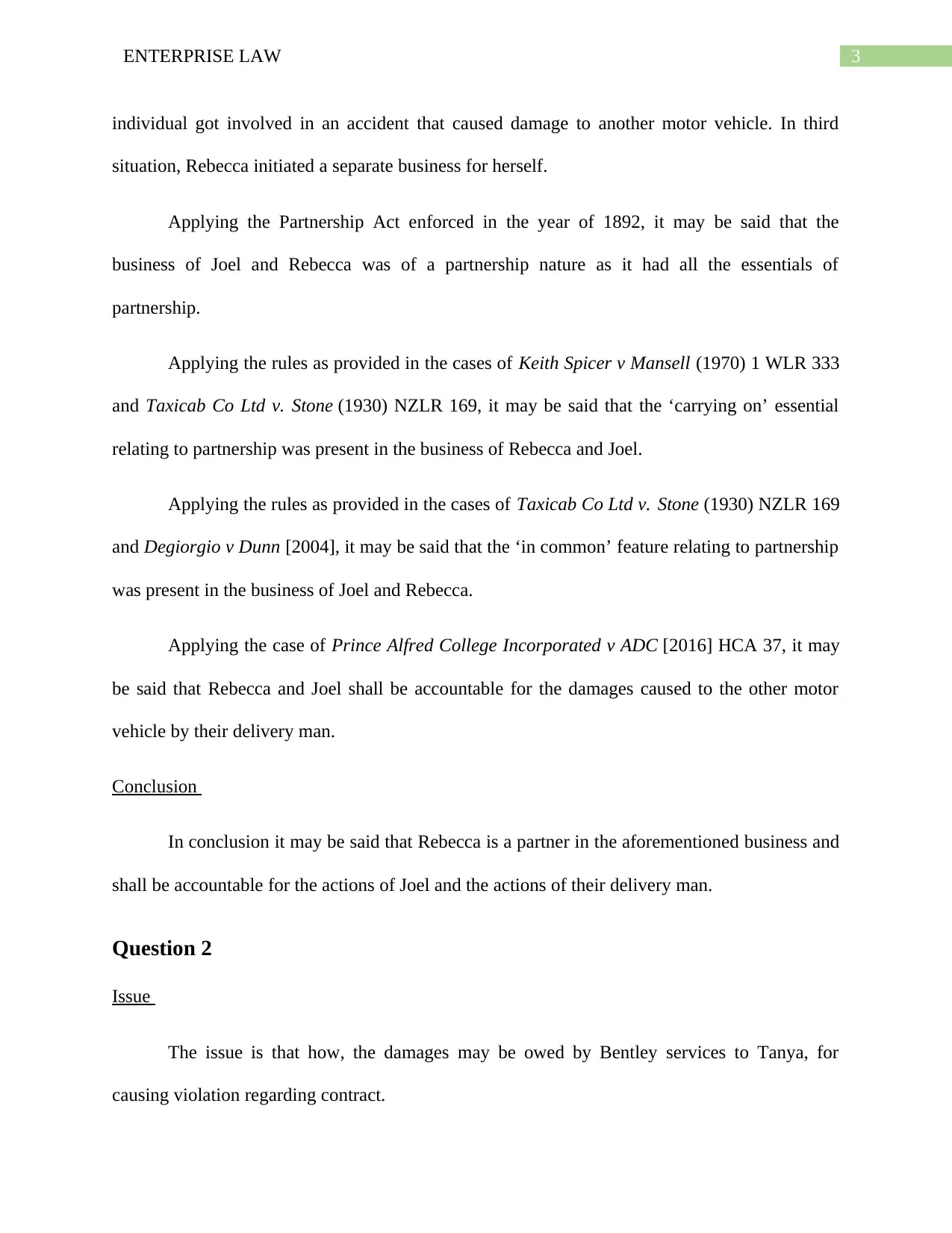
3ENTERPRISE LAW
individual got involved in an accident that caused damage to another motor vehicle. In third
situation, Rebecca initiated a separate business for herself.
Applying the Partnership Act enforced in the year of 1892, it may be said that the
business of Joel and Rebecca was of a partnership nature as it had all the essentials of
partnership.
Applying the rules as provided in the cases of Keith Spicer v Mansell (1970) 1 WLR 333
and Taxicab Co Ltd v. Stone (1930) NZLR 169, it may be said that the ‘carrying on’ essential
relating to partnership was present in the business of Rebecca and Joel.
Applying the rules as provided in the cases of Taxicab Co Ltd v. Stone (1930) NZLR 169
and Degiorgio v Dunn [2004], it may be said that the ‘in common’ feature relating to partnership
was present in the business of Joel and Rebecca.
Applying the case of Prince Alfred College Incorporated v ADC [2016] HCA 37, it may
be said that Rebecca and Joel shall be accountable for the damages caused to the other motor
vehicle by their delivery man.
Conclusion
In conclusion it may be said that Rebecca is a partner in the aforementioned business and
shall be accountable for the actions of Joel and the actions of their delivery man.
Question 2
Issue
The issue is that how, the damages may be owed by Bentley services to Tanya, for
causing violation regarding contract.
individual got involved in an accident that caused damage to another motor vehicle. In third
situation, Rebecca initiated a separate business for herself.
Applying the Partnership Act enforced in the year of 1892, it may be said that the
business of Joel and Rebecca was of a partnership nature as it had all the essentials of
partnership.
Applying the rules as provided in the cases of Keith Spicer v Mansell (1970) 1 WLR 333
and Taxicab Co Ltd v. Stone (1930) NZLR 169, it may be said that the ‘carrying on’ essential
relating to partnership was present in the business of Rebecca and Joel.
Applying the rules as provided in the cases of Taxicab Co Ltd v. Stone (1930) NZLR 169
and Degiorgio v Dunn [2004], it may be said that the ‘in common’ feature relating to partnership
was present in the business of Joel and Rebecca.
Applying the case of Prince Alfred College Incorporated v ADC [2016] HCA 37, it may
be said that Rebecca and Joel shall be accountable for the damages caused to the other motor
vehicle by their delivery man.
Conclusion
In conclusion it may be said that Rebecca is a partner in the aforementioned business and
shall be accountable for the actions of Joel and the actions of their delivery man.
Question 2
Issue
The issue is that how, the damages may be owed by Bentley services to Tanya, for
causing violation regarding contract.
Secure Best Marks with AI Grader
Need help grading? Try our AI Grader for instant feedback on your assignments.
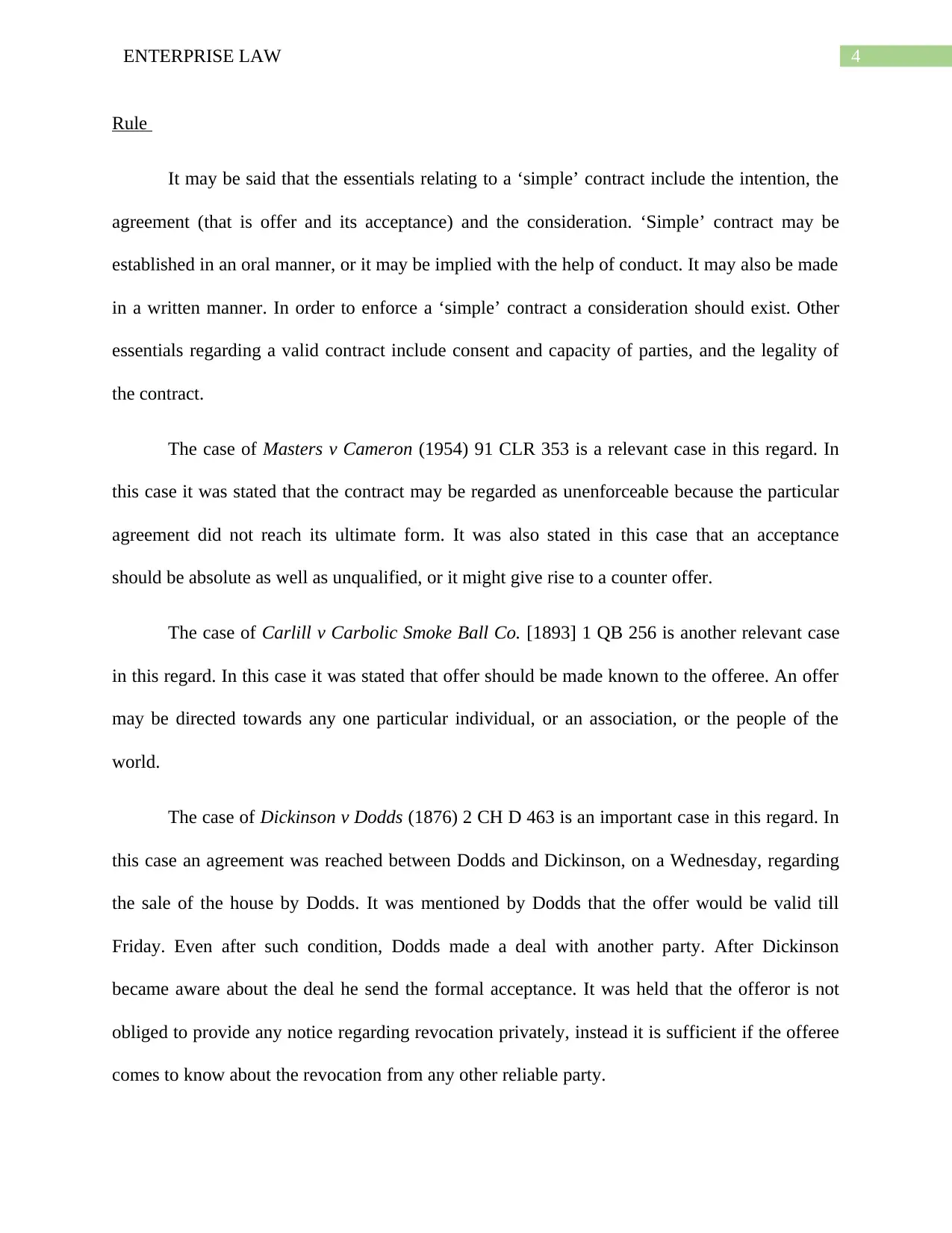
4ENTERPRISE LAW
Rule
It may be said that the essentials relating to a ‘simple’ contract include the intention, the
agreement (that is offer and its acceptance) and the consideration. ‘Simple’ contract may be
established in an oral manner, or it may be implied with the help of conduct. It may also be made
in a written manner. In order to enforce a ‘simple’ contract a consideration should exist. Other
essentials regarding a valid contract include consent and capacity of parties, and the legality of
the contract.
The case of Masters v Cameron (1954) 91 CLR 353 is a relevant case in this regard. In
this case it was stated that the contract may be regarded as unenforceable because the particular
agreement did not reach its ultimate form. It was also stated in this case that an acceptance
should be absolute as well as unqualified, or it might give rise to a counter offer.
The case of Carlill v Carbolic Smoke Ball Co. [1893] 1 QB 256 is another relevant case
in this regard. In this case it was stated that offer should be made known to the offeree. An offer
may be directed towards any one particular individual, or an association, or the people of the
world.
The case of Dickinson v Dodds (1876) 2 CH D 463 is an important case in this regard. In
this case an agreement was reached between Dodds and Dickinson, on a Wednesday, regarding
the sale of the house by Dodds. It was mentioned by Dodds that the offer would be valid till
Friday. Even after such condition, Dodds made a deal with another party. After Dickinson
became aware about the deal he send the formal acceptance. It was held that the offeror is not
obliged to provide any notice regarding revocation privately, instead it is sufficient if the offeree
comes to know about the revocation from any other reliable party.
Rule
It may be said that the essentials relating to a ‘simple’ contract include the intention, the
agreement (that is offer and its acceptance) and the consideration. ‘Simple’ contract may be
established in an oral manner, or it may be implied with the help of conduct. It may also be made
in a written manner. In order to enforce a ‘simple’ contract a consideration should exist. Other
essentials regarding a valid contract include consent and capacity of parties, and the legality of
the contract.
The case of Masters v Cameron (1954) 91 CLR 353 is a relevant case in this regard. In
this case it was stated that the contract may be regarded as unenforceable because the particular
agreement did not reach its ultimate form. It was also stated in this case that an acceptance
should be absolute as well as unqualified, or it might give rise to a counter offer.
The case of Carlill v Carbolic Smoke Ball Co. [1893] 1 QB 256 is another relevant case
in this regard. In this case it was stated that offer should be made known to the offeree. An offer
may be directed towards any one particular individual, or an association, or the people of the
world.
The case of Dickinson v Dodds (1876) 2 CH D 463 is an important case in this regard. In
this case an agreement was reached between Dodds and Dickinson, on a Wednesday, regarding
the sale of the house by Dodds. It was mentioned by Dodds that the offer would be valid till
Friday. Even after such condition, Dodds made a deal with another party. After Dickinson
became aware about the deal he send the formal acceptance. It was held that the offeror is not
obliged to provide any notice regarding revocation privately, instead it is sufficient if the offeree
comes to know about the revocation from any other reliable party.
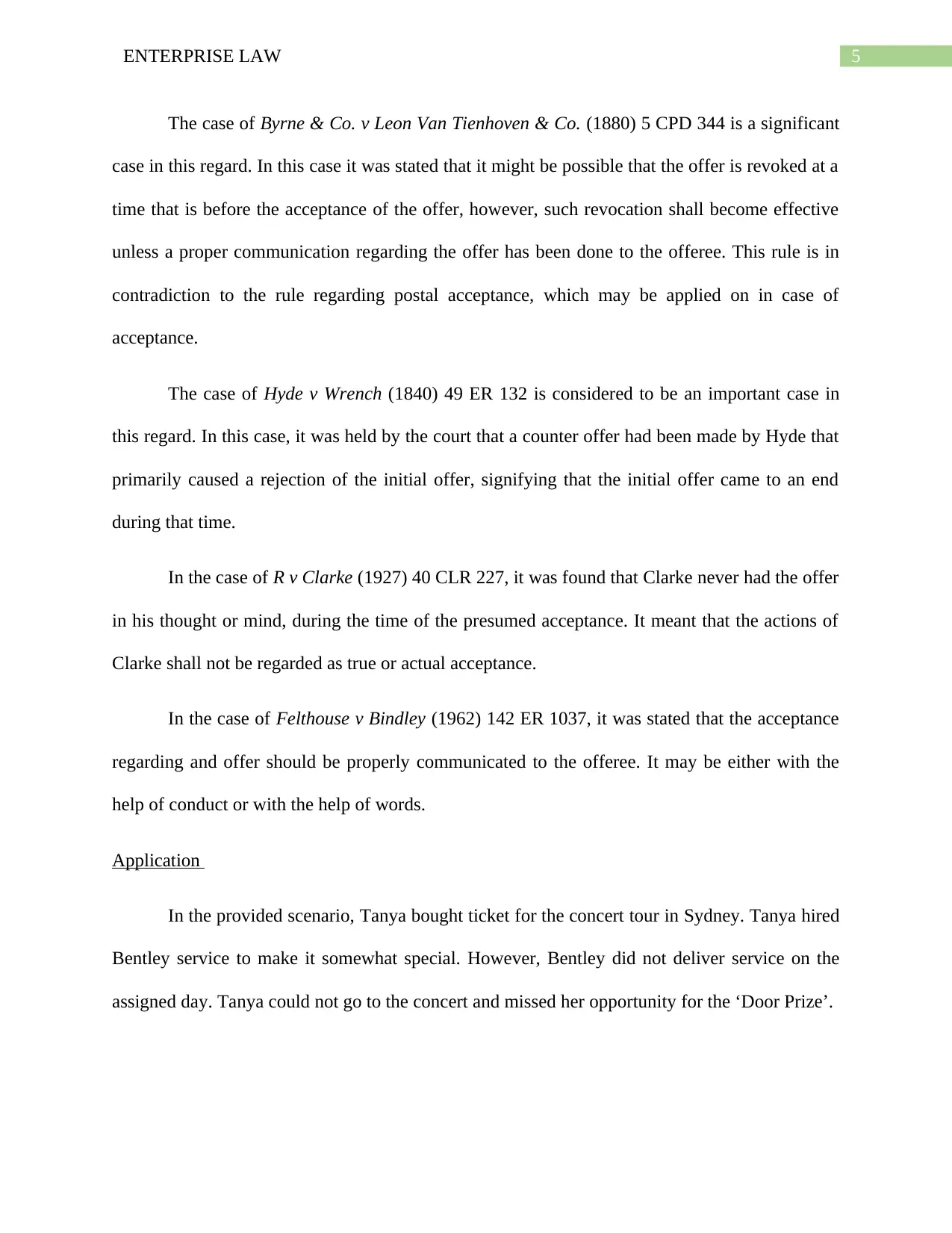
5ENTERPRISE LAW
The case of Byrne & Co. v Leon Van Tienhoven & Co. (1880) 5 CPD 344 is a significant
case in this regard. In this case it was stated that it might be possible that the offer is revoked at a
time that is before the acceptance of the offer, however, such revocation shall become effective
unless a proper communication regarding the offer has been done to the offeree. This rule is in
contradiction to the rule regarding postal acceptance, which may be applied on in case of
acceptance.
The case of Hyde v Wrench (1840) 49 ER 132 is considered to be an important case in
this regard. In this case, it was held by the court that a counter offer had been made by Hyde that
primarily caused a rejection of the initial offer, signifying that the initial offer came to an end
during that time.
In the case of R v Clarke (1927) 40 CLR 227, it was found that Clarke never had the offer
in his thought or mind, during the time of the presumed acceptance. It meant that the actions of
Clarke shall not be regarded as true or actual acceptance.
In the case of Felthouse v Bindley (1962) 142 ER 1037, it was stated that the acceptance
regarding and offer should be properly communicated to the offeree. It may be either with the
help of conduct or with the help of words.
Application
In the provided scenario, Tanya bought ticket for the concert tour in Sydney. Tanya hired
Bentley service to make it somewhat special. However, Bentley did not deliver service on the
assigned day. Tanya could not go to the concert and missed her opportunity for the ‘Door Prize’.
The case of Byrne & Co. v Leon Van Tienhoven & Co. (1880) 5 CPD 344 is a significant
case in this regard. In this case it was stated that it might be possible that the offer is revoked at a
time that is before the acceptance of the offer, however, such revocation shall become effective
unless a proper communication regarding the offer has been done to the offeree. This rule is in
contradiction to the rule regarding postal acceptance, which may be applied on in case of
acceptance.
The case of Hyde v Wrench (1840) 49 ER 132 is considered to be an important case in
this regard. In this case, it was held by the court that a counter offer had been made by Hyde that
primarily caused a rejection of the initial offer, signifying that the initial offer came to an end
during that time.
In the case of R v Clarke (1927) 40 CLR 227, it was found that Clarke never had the offer
in his thought or mind, during the time of the presumed acceptance. It meant that the actions of
Clarke shall not be regarded as true or actual acceptance.
In the case of Felthouse v Bindley (1962) 142 ER 1037, it was stated that the acceptance
regarding and offer should be properly communicated to the offeree. It may be either with the
help of conduct or with the help of words.
Application
In the provided scenario, Tanya bought ticket for the concert tour in Sydney. Tanya hired
Bentley service to make it somewhat special. However, Bentley did not deliver service on the
assigned day. Tanya could not go to the concert and missed her opportunity for the ‘Door Prize’.
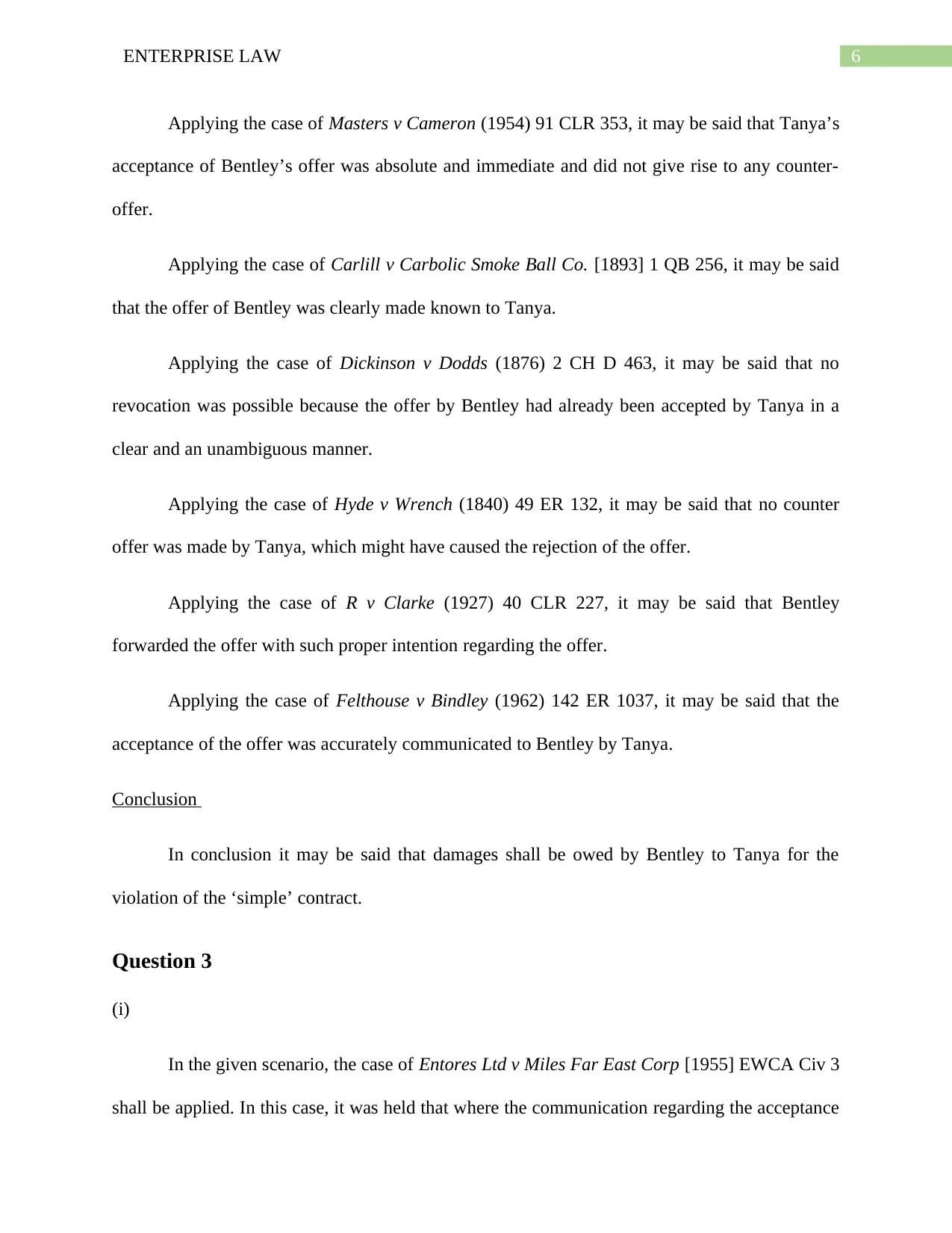
6ENTERPRISE LAW
Applying the case of Masters v Cameron (1954) 91 CLR 353, it may be said that Tanya’s
acceptance of Bentley’s offer was absolute and immediate and did not give rise to any counter-
offer.
Applying the case of Carlill v Carbolic Smoke Ball Co. [1893] 1 QB 256, it may be said
that the offer of Bentley was clearly made known to Tanya.
Applying the case of Dickinson v Dodds (1876) 2 CH D 463, it may be said that no
revocation was possible because the offer by Bentley had already been accepted by Tanya in a
clear and an unambiguous manner.
Applying the case of Hyde v Wrench (1840) 49 ER 132, it may be said that no counter
offer was made by Tanya, which might have caused the rejection of the offer.
Applying the case of R v Clarke (1927) 40 CLR 227, it may be said that Bentley
forwarded the offer with such proper intention regarding the offer.
Applying the case of Felthouse v Bindley (1962) 142 ER 1037, it may be said that the
acceptance of the offer was accurately communicated to Bentley by Tanya.
Conclusion
In conclusion it may be said that damages shall be owed by Bentley to Tanya for the
violation of the ‘simple’ contract.
Question 3
(i)
In the given scenario, the case of Entores Ltd v Miles Far East Corp [1955] EWCA Civ 3
shall be applied. In this case, it was held that where the communication regarding the acceptance
Applying the case of Masters v Cameron (1954) 91 CLR 353, it may be said that Tanya’s
acceptance of Bentley’s offer was absolute and immediate and did not give rise to any counter-
offer.
Applying the case of Carlill v Carbolic Smoke Ball Co. [1893] 1 QB 256, it may be said
that the offer of Bentley was clearly made known to Tanya.
Applying the case of Dickinson v Dodds (1876) 2 CH D 463, it may be said that no
revocation was possible because the offer by Bentley had already been accepted by Tanya in a
clear and an unambiguous manner.
Applying the case of Hyde v Wrench (1840) 49 ER 132, it may be said that no counter
offer was made by Tanya, which might have caused the rejection of the offer.
Applying the case of R v Clarke (1927) 40 CLR 227, it may be said that Bentley
forwarded the offer with such proper intention regarding the offer.
Applying the case of Felthouse v Bindley (1962) 142 ER 1037, it may be said that the
acceptance of the offer was accurately communicated to Bentley by Tanya.
Conclusion
In conclusion it may be said that damages shall be owed by Bentley to Tanya for the
violation of the ‘simple’ contract.
Question 3
(i)
In the given scenario, the case of Entores Ltd v Miles Far East Corp [1955] EWCA Civ 3
shall be applied. In this case, it was held that where the communication regarding the acceptance
Paraphrase This Document
Need a fresh take? Get an instant paraphrase of this document with our AI Paraphraser
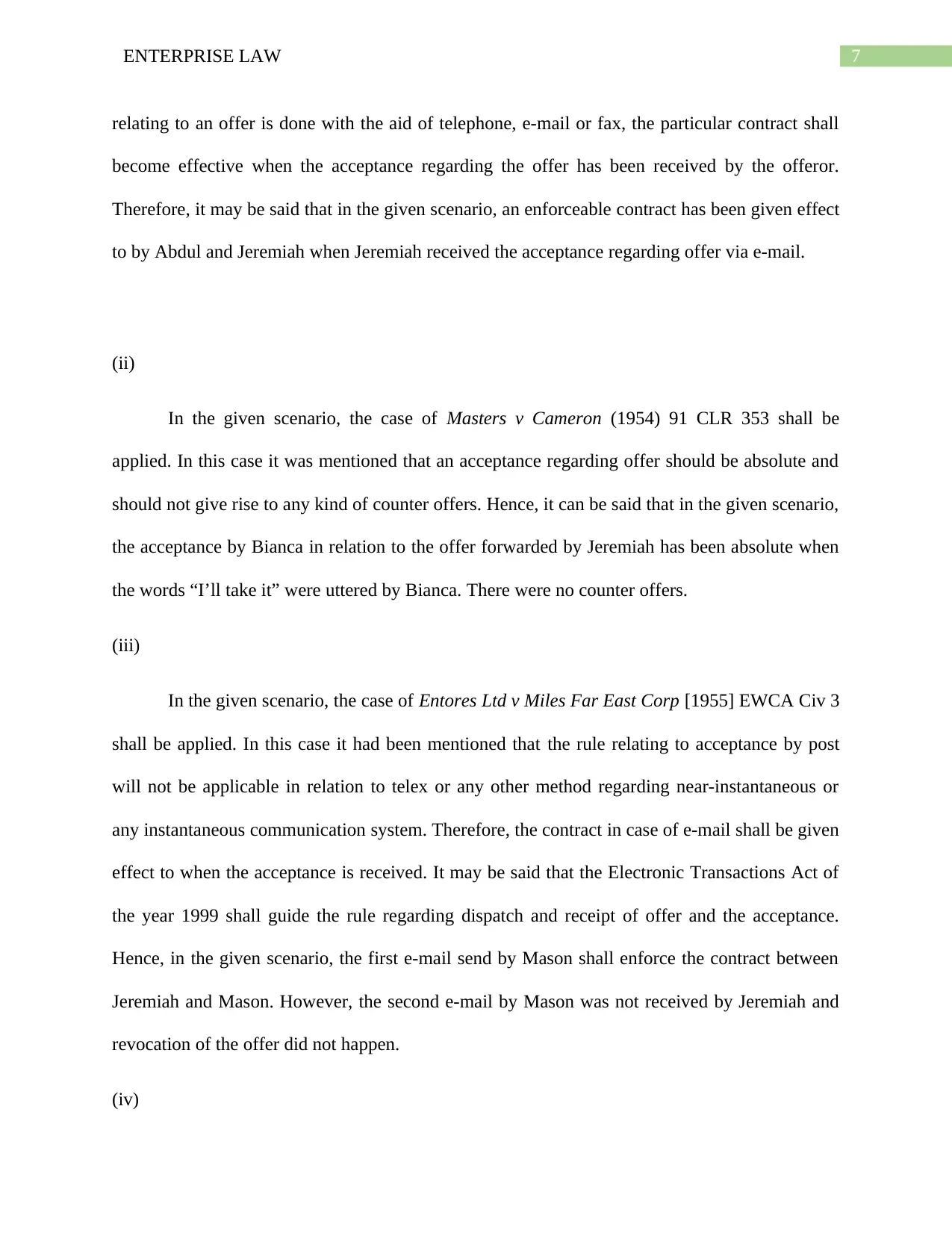
7ENTERPRISE LAW
relating to an offer is done with the aid of telephone, e-mail or fax, the particular contract shall
become effective when the acceptance regarding the offer has been received by the offeror.
Therefore, it may be said that in the given scenario, an enforceable contract has been given effect
to by Abdul and Jeremiah when Jeremiah received the acceptance regarding offer via e-mail.
(ii)
In the given scenario, the case of Masters v Cameron (1954) 91 CLR 353 shall be
applied. In this case it was mentioned that an acceptance regarding offer should be absolute and
should not give rise to any kind of counter offers. Hence, it can be said that in the given scenario,
the acceptance by Bianca in relation to the offer forwarded by Jeremiah has been absolute when
the words “I’ll take it” were uttered by Bianca. There were no counter offers.
(iii)
In the given scenario, the case of Entores Ltd v Miles Far East Corp [1955] EWCA Civ 3
shall be applied. In this case it had been mentioned that the rule relating to acceptance by post
will not be applicable in relation to telex or any other method regarding near-instantaneous or
any instantaneous communication system. Therefore, the contract in case of e-mail shall be given
effect to when the acceptance is received. It may be said that the Electronic Transactions Act of
the year 1999 shall guide the rule regarding dispatch and receipt of offer and the acceptance.
Hence, in the given scenario, the first e-mail send by Mason shall enforce the contract between
Jeremiah and Mason. However, the second e-mail by Mason was not received by Jeremiah and
revocation of the offer did not happen.
(iv)
relating to an offer is done with the aid of telephone, e-mail or fax, the particular contract shall
become effective when the acceptance regarding the offer has been received by the offeror.
Therefore, it may be said that in the given scenario, an enforceable contract has been given effect
to by Abdul and Jeremiah when Jeremiah received the acceptance regarding offer via e-mail.
(ii)
In the given scenario, the case of Masters v Cameron (1954) 91 CLR 353 shall be
applied. In this case it was mentioned that an acceptance regarding offer should be absolute and
should not give rise to any kind of counter offers. Hence, it can be said that in the given scenario,
the acceptance by Bianca in relation to the offer forwarded by Jeremiah has been absolute when
the words “I’ll take it” were uttered by Bianca. There were no counter offers.
(iii)
In the given scenario, the case of Entores Ltd v Miles Far East Corp [1955] EWCA Civ 3
shall be applied. In this case it had been mentioned that the rule relating to acceptance by post
will not be applicable in relation to telex or any other method regarding near-instantaneous or
any instantaneous communication system. Therefore, the contract in case of e-mail shall be given
effect to when the acceptance is received. It may be said that the Electronic Transactions Act of
the year 1999 shall guide the rule regarding dispatch and receipt of offer and the acceptance.
Hence, in the given scenario, the first e-mail send by Mason shall enforce the contract between
Jeremiah and Mason. However, the second e-mail by Mason was not received by Jeremiah and
revocation of the offer did not happen.
(iv)
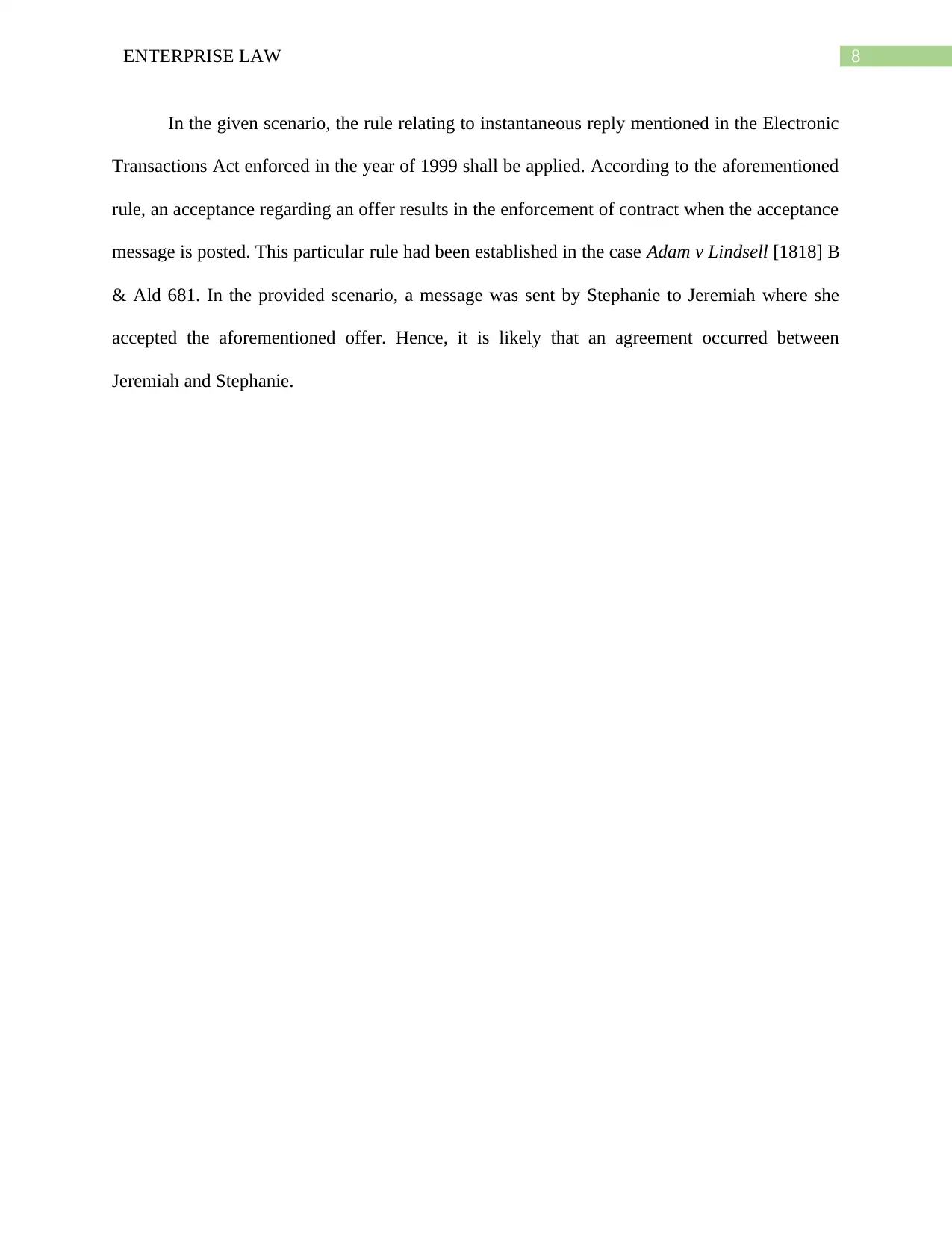
8ENTERPRISE LAW
In the given scenario, the rule relating to instantaneous reply mentioned in the Electronic
Transactions Act enforced in the year of 1999 shall be applied. According to the aforementioned
rule, an acceptance regarding an offer results in the enforcement of contract when the acceptance
message is posted. This particular rule had been established in the case Adam v Lindsell [1818] B
& Ald 681. In the provided scenario, a message was sent by Stephanie to Jeremiah where she
accepted the aforementioned offer. Hence, it is likely that an agreement occurred between
Jeremiah and Stephanie.
In the given scenario, the rule relating to instantaneous reply mentioned in the Electronic
Transactions Act enforced in the year of 1999 shall be applied. According to the aforementioned
rule, an acceptance regarding an offer results in the enforcement of contract when the acceptance
message is posted. This particular rule had been established in the case Adam v Lindsell [1818] B
& Ald 681. In the provided scenario, a message was sent by Stephanie to Jeremiah where she
accepted the aforementioned offer. Hence, it is likely that an agreement occurred between
Jeremiah and Stephanie.
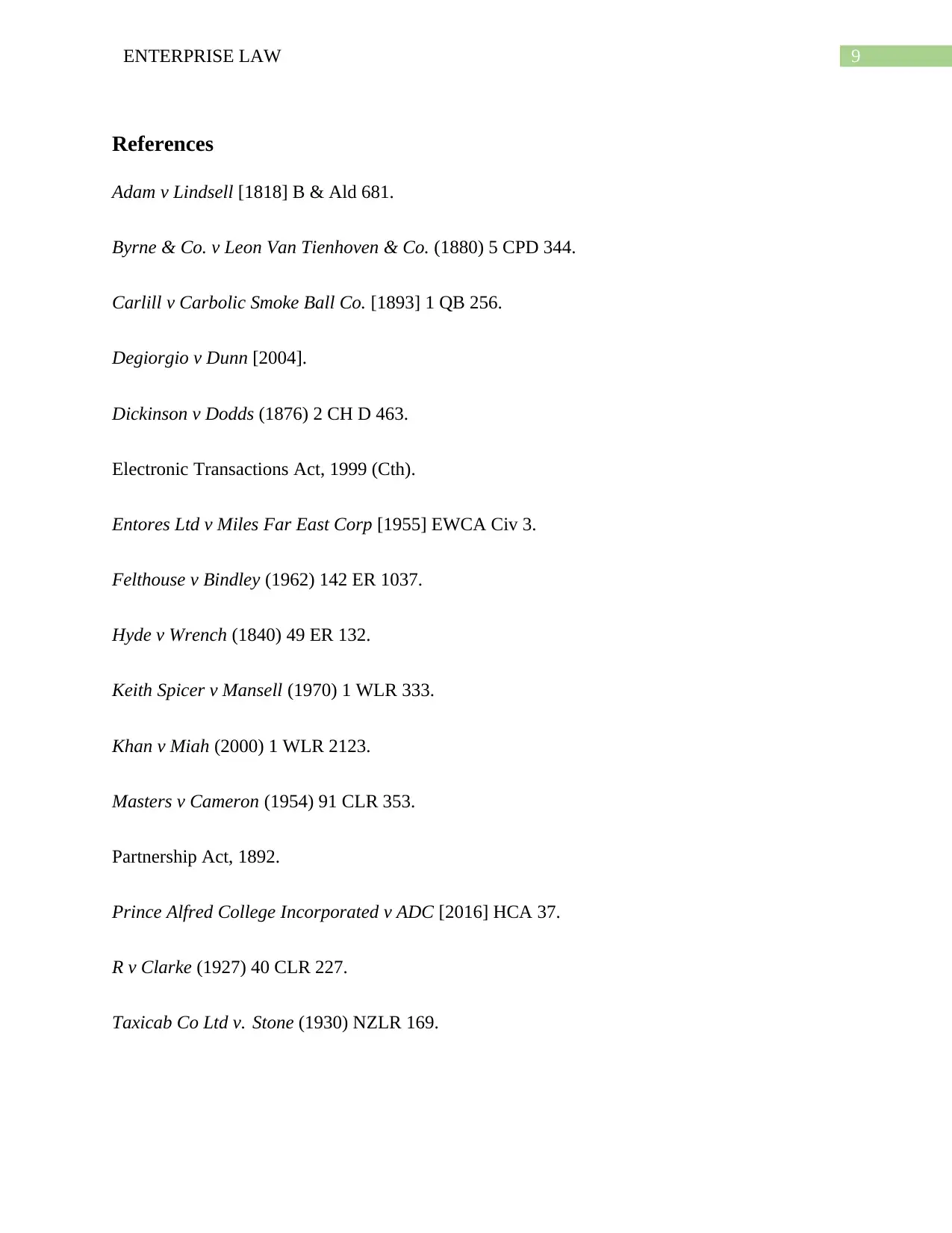
9ENTERPRISE LAW
References
Adam v Lindsell [1818] B & Ald 681.
Byrne & Co. v Leon Van Tienhoven & Co. (1880) 5 CPD 344.
Carlill v Carbolic Smoke Ball Co. [1893] 1 QB 256.
Degiorgio v Dunn [2004].
Dickinson v Dodds (1876) 2 CH D 463.
Electronic Transactions Act, 1999 (Cth).
Entores Ltd v Miles Far East Corp [1955] EWCA Civ 3.
Felthouse v Bindley (1962) 142 ER 1037.
Hyde v Wrench (1840) 49 ER 132.
Keith Spicer v Mansell (1970) 1 WLR 333.
Khan v Miah (2000) 1 WLR 2123.
Masters v Cameron (1954) 91 CLR 353.
Partnership Act, 1892.
Prince Alfred College Incorporated v ADC [2016] HCA 37.
R v Clarke (1927) 40 CLR 227.
Taxicab Co Ltd v. Stone (1930) NZLR 169.
References
Adam v Lindsell [1818] B & Ald 681.
Byrne & Co. v Leon Van Tienhoven & Co. (1880) 5 CPD 344.
Carlill v Carbolic Smoke Ball Co. [1893] 1 QB 256.
Degiorgio v Dunn [2004].
Dickinson v Dodds (1876) 2 CH D 463.
Electronic Transactions Act, 1999 (Cth).
Entores Ltd v Miles Far East Corp [1955] EWCA Civ 3.
Felthouse v Bindley (1962) 142 ER 1037.
Hyde v Wrench (1840) 49 ER 132.
Keith Spicer v Mansell (1970) 1 WLR 333.
Khan v Miah (2000) 1 WLR 2123.
Masters v Cameron (1954) 91 CLR 353.
Partnership Act, 1892.
Prince Alfred College Incorporated v ADC [2016] HCA 37.
R v Clarke (1927) 40 CLR 227.
Taxicab Co Ltd v. Stone (1930) NZLR 169.
1 out of 10
Your All-in-One AI-Powered Toolkit for Academic Success.
+13062052269
info@desklib.com
Available 24*7 on WhatsApp / Email
![[object Object]](/_next/static/media/star-bottom.7253800d.svg)
Unlock your academic potential
© 2024 | Zucol Services PVT LTD | All rights reserved.

